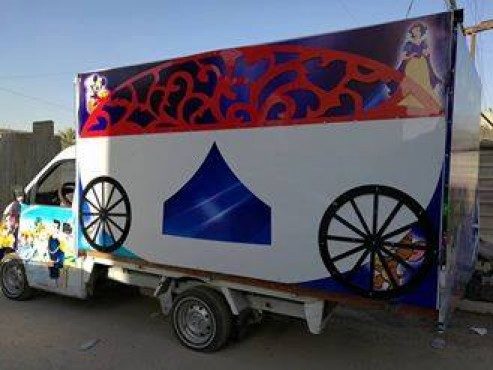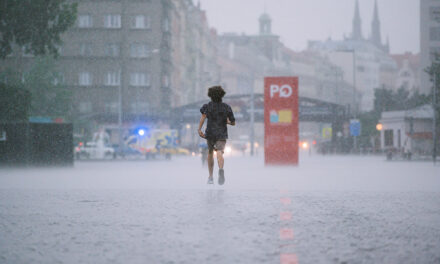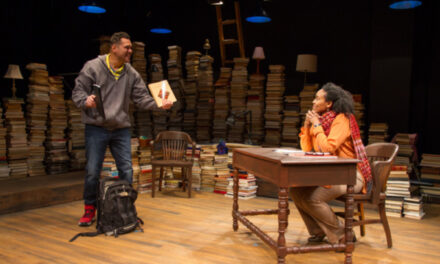Converting a pick-up truck into a mobile theatre isn’t that easy, says Hussein Ali Saleh, an Iraqi actor. Decorations were needed as was technical equipment required for stagecraft. But Saleh managed this and now he plans to tour the country presenting family-friendly plays to Iraqi children. At a time when theatre dedicated just to children has almost died out in Iraq, Saleh has three different shows to entertain his juvenile audiences.
One of the pieces played at Baghdad’s National Theatre as part of a peace festival and kids could also see it at Zawraa park as part of a UNICEF event; Saleh has also put it on in different locations around Iraq. Saleh decided to make his shows mobile after trying to put on plays at schools; confronted with various reasons why it wasn’t possible – security problems, lack of transport for the children, official approvals needed from parents and ministerial offices – Saleh decided to bring the performances to the audience instead.
“[All the problems] just made me more determined to reach out to the students,” Saleh told NIQASH. Now when the pick-up truck is converted into a theatre, it offers a stage that is three meters deep and five meters wide. And it does indeed look like a real theatre. “Theatre is such an important art form,” Saleh explains. “We learned a lot from it when we were young. It can help children learn many lessons. Sadly, too few Iraqi children have experienced this.”
“Children’s theatre disappeared in Iraq years ago and there have been no real efforts made to reactivate it – even though it is a fantastic pedagogical tool,” says Fatin al-Jarrah, a director of children’s plays and former head of a children’s culture center. “A few years ago we were successful in teaming up with a civil society organization and bringing some plays to 25 schools. We visited them during the school year and put on the plays in their classrooms.”
“The problem is that we have thousands of public primary schools in Iraq and 1,200 private schools. A mobile theater – or any other group- can’t get around all of them and the Ministry of Education isn’t interested in helping as it doesn’t focus on children’s theatre. It has its own department for activities,” al-Jarrah concluded.
Samarqand al-Jabiri, a poet and story writer, has participated in many children’s theatre activities and says that in recent years, puppet shows have been a success with younger viewers; she is a supporter of the mobile theatre. “In general kids are more likely to watch cartoons on TV or play games on their phones than come to a play,” she argues. “That’s why we need to work harder on children’s theatre.”
Saleh hopes that in the future he can cooperate with the Iraqi Ministry of Education and that he will be able to stage his shows in classrooms too.
The children love it, Saleh argues. “Many of them want to ride in the theatre-car, they want to come with me and tour the country, some cry when the show finishes. And others want me to park the car near their homes!”
And he would also like to go into refugee camps and orphanages and to more remote areas, such as Iraq’s southern marshlands, and show children his plays. With his mobile theatre, the possibilities are endless, he says.
This article was originally published on http://niqash.org. Reposted with permission. Read the original article.
This post was written by the author in their personal capacity.The opinions expressed in this article are the author’s own and do not reflect the view of The Theatre Times, their staff or collaborators.
This post was written by Afrah Shawqi.
The views expressed here belong to the author and do not necessarily reflect our views and opinions.


















